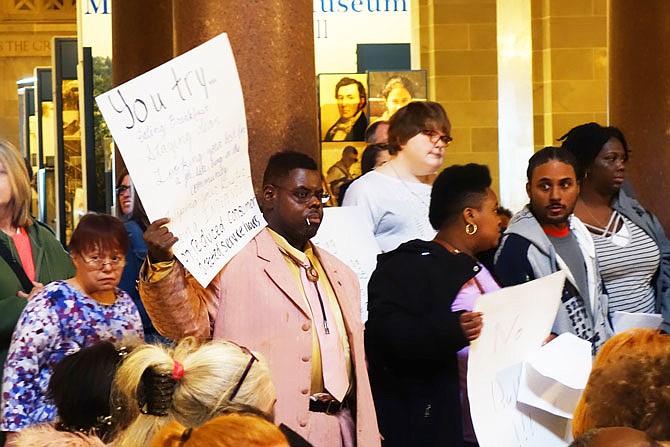JEFFERSON CITY, Mo. - Hundreds of disability rights advocates arrived Wednesday at the Capitol for the 17th Annual Disability Rights Legislative Day.
They packed the ground floor beneath the dome so tightly, those in wheelchairs had to be careful not to run over any toes.
"We're here to advocate for people with disabilities," Angie White said.
She's a client of Life Unlimited in Kansas City. She and her fellow client and friend, Mary Ann Arnold, traveled all the way to Jefferson City to speak with representatives about the needs of people with disabilities.
"I'm going to tell them that we need to have people look after other people," White added.
Arnold said she was concerned about the treatment of people in group homes and other types of supported living situations.
"People in group homes are being mistreated," she said. "I believe in friendships and I believe in Jesus Christ."
She does not, however, believe people with disabilities in Missouri are receiving the best care and support possible.
Event organizers brought up Carl DeBrodie, the developmentally disabilities who vanished from a group home in Fulton and was found dead in April, as an example.
"I cannot believe that something like that could ever happen especially someone who is under the auspices of a public (entity)," said Leslie Anderson, director of public policy and advocacy for Services for Independent Living in Columbia.
Wednesday's rally included a moment of silence in DeBrodie's memory. However, activists were doing much more than simply remembering DeBrodie - they were advocating for legislative changes to help prevent future tragedies.
One change is House Bill 1553, which introduces revisions to Missouri's guardianship law.
"That law is 30 years old," Anderson said.
HB 1553, sponsored by State Rep. James Neely, R-Cameron, would introduce a series of changes designed to bring greater oversight to the guardianship process. Neely also hopes to reduce the number of people unnecessarily put into or kept under guardianship.
"People hear the word 'guardian' and think guardian angel," said Elizabeth Moran, an attorney and disability rights advocate. "For many people, what guardianship is is a 10-minute hearing that strips you of your civil rights."
According to advocates, the current system isn't focused on individuals. The new legislation would put a heavier focus on "least restrictive alternatives," putting individual needs front and center.
There were other talking points as well, such as HB 2130, which establishes the "Missouri Employment First Act" to require state agencies to promote integrated employment.
Speakers discussed ABLE accounts, which allow people with disabilities to have savings accounts that don't count as an asset. If a person with disabilities who receives services, pensions, or other types of support or funding accumulates too many assets, they could lose that assistance. This makes saving for the future nearly impossible, advocates say.

